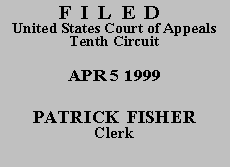

| LARRY D. SCARBROUGH,
Plaintiff-Appellant, v. KENNETH S. APFEL, Commissioner of Social Security Administration, Defendant-Appellee. |
|
Plaintiff Larry D. Scarbrough appeals from an order of the district court affirming the Commissioner's determination that he is not entitled to benefits. We affirm.
We review the Commissioner's decision to determine whether his factual findings were supported by substantial evidence in light of the entire record and to determine whether he applied the correct legal standards. See Castellano v. Secretary of Health & Human Servs., 26 F.3d 1027, 1028 (10th Cir. 1994). Substantial evidence is "such relevant evidence as a reasonable mind might accept as adequate to support a conclusion." Id. (quotations omitted). In the course of our review, we may "neither reweigh the evidence nor substitute our judgment for that of the agency." Casias v. Secretary of Health & Human Servs., 933 F.2d 799, 800 (10th Cir. 1991).
Mr. Scarbrough alleged disability due to back problems arising from an on-the-job accident. The administrative law judge (ALJ) determined that Mr. Scarbrough was not disabled at step five of the five-step sequential process, see Williams v. Bowen, 844 F.2d 748, 750-52 (10th Cir. 1988), as he retained the residual functional capacity to perform light work.
On appeal, Mr. Scarbrough argues that the ALJ failed to shift the burden to the Commissioner at step five and thus failed to require the Commissioner to prove that Mr. Scarbrough could perform light work. He also contends that the ALJ relied on an incorrect onset date, failed to consider his preexisting neck impairment, ignored the treating physician's opinion, and "lumped" all the evidence together rather than considering Mr. Scarbrough's impairments in distinct periods of time. Finally, he asserts that the ALJ's pain and credibility determinations were not based on substantial evidence.
We decline to address Mr. Scarbrough's contention that the ALJ failed to shift the burden to the Commissioner at step five as he did not raise that argument to the district court. See Crow v. Shalala, 40 F.3d 323, 324 (10th Cir. 1994). We also decline to address Mr. Scarbrough's contentions that the ALJ applied the wrong onset date and "lumped" all the evidence together. Those arguments also were not raised below.
Mr. Scarbrough argues the ALJ ignored his treating physician's opinion regarding his disability status. The record shows that Mr. Scarbrough's treating physician, Dr. Vosburg, did not see Mr. Scarbrough after his laminectomy nor did he opine that Mr. Scarbrough was disabled from all work. We issued a show cause order to counsel regarding whether sanctions should be imposed due to counsels' misstatements of the facts. Upon consideration of counsels' response, the order is discharged. However, counsel are cautioned about misstating the facts in briefs to this court and drawing unwarranted conclusions from the facts in an effort to benefit their client. Advocacy for their client must be tempered by counsels' responsibilities as officers of this court. Sanctions may be imposed for future violations.
Mr. Scarbrough contends the ALJ failed to consider the impact of his neck impairment. Mr. Scarbrough broke his neck in 1983. He later returned to heavy labor and performed that work until 1990 when he first injured his back. In 1991, a physician noted that Mr. Scarbrough had no evidence of degenerative disc disease or arthritis of the neck. As he presented no evidence that his neck injuries had worsened since he last performed heavy labor, the ALJ had no need to consider whether Mr. Scarbrough's neck injury was disabling.
Mr. Scarbrough asserts the ALJ erred in his credibility assessment and thereby erred in his pain determination and in the hypothetical he presented to the vocational expert. "Credibility determinations are peculiarly the province of the finder of fact, and we will not upset such determinations when supported by substantial evidence." Diaz v. Secretary of Health & Human Servs., 898 F.2d 774, 777 (10th Cir. 1990).
The record shows that Mr. Scarbrough made excellent progress after his laminectomy in 1993. The record supports the ALJ's determination that Mr. Scarbrough's complaints of pain were not fully credible. See Kepler v. Chater, 68 F.3d 387, 391 (10th Cir. 1995) (ALJ should consider extensiveness of medical and nonmedical attempts to obtain relief and frequency of medical contacts in assessing credibility).
As the ALJ found Mr. Scarbrough's testimony on the extent of his limitations was neither completely credible nor supported by substantial evidence, he was not required to accept all his testimony as to his physical limitations in his hypothetical. See Evans v. Chater, 55 F.3d 530, 532 (10th Cir. 1995) (ALJ's hypothetical questions to vocational expert "must include all (and only) those impairments borne out by the evidentiary record").
Upon review of the record, we determine that the ALJ's decision was supported by substantial evidence and no error occurred. The judgment of the United States District Court for the Northern District of Oklahoma is AFFIRMED. The show cause order of March 18, 1999 is DISCHARGED.
Entered for the Court
Circuit Judge
*. This order and judgment is not binding precedent, except under the doctrines of law of the case, res judicata, and collateral estoppel. The court generally disfavors the citation of orders and judgments; nevertheless, an order and judgment may be cited under the terms and conditions of 10th Cir. R. 36.3.